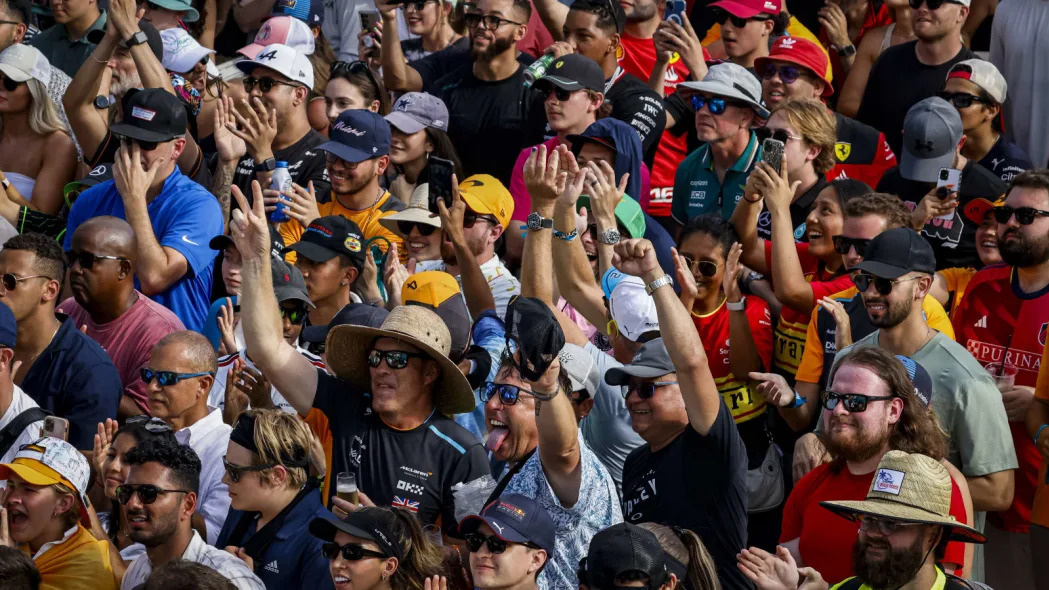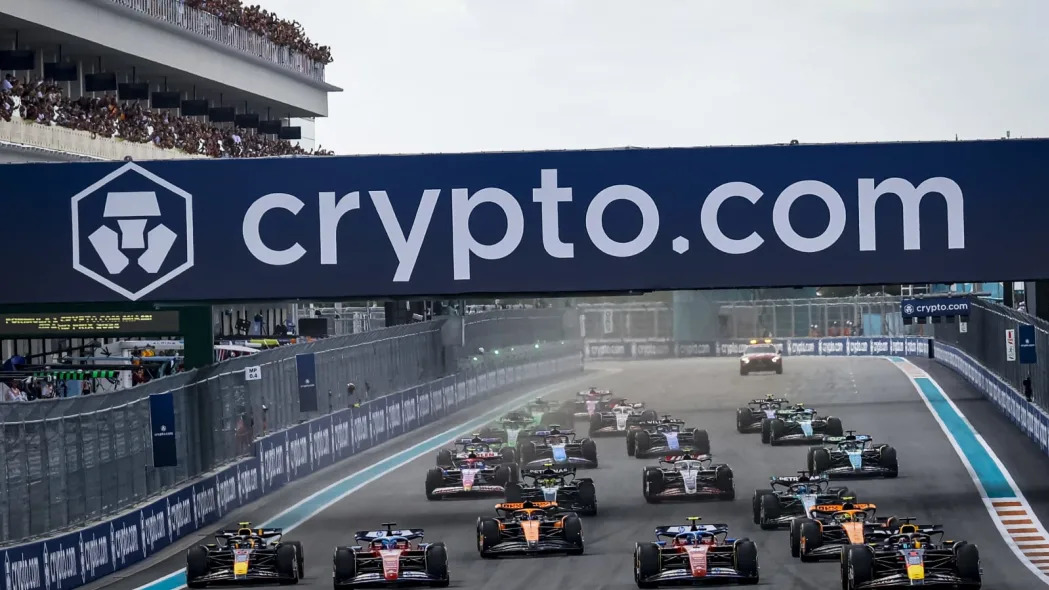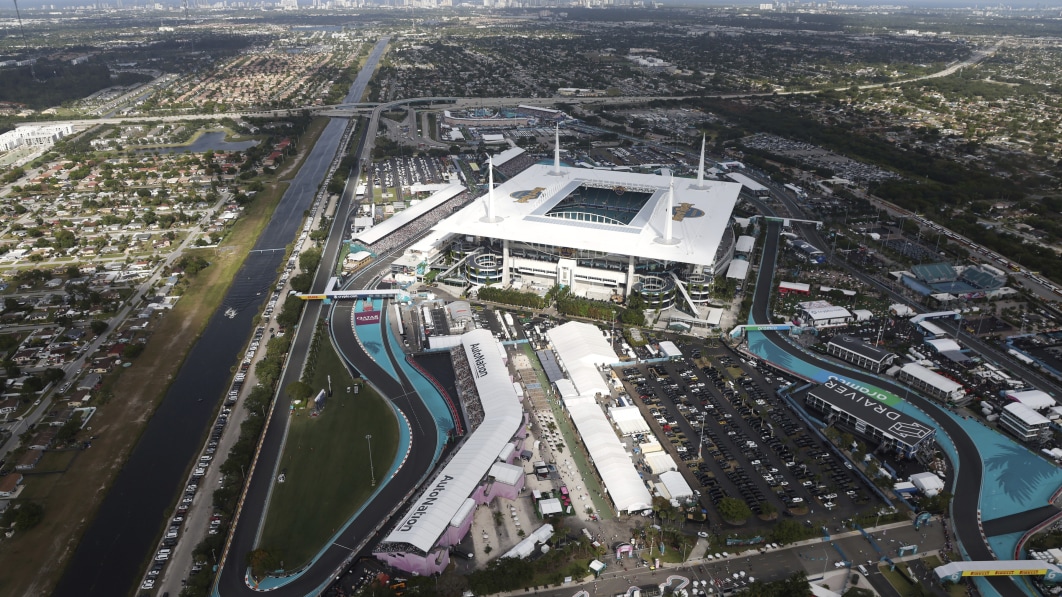The Miami Grand Prix just had its three-year anniversary last weekend, and we stopped by to see how it was doing and what it’s like to attend a Formula 1 race there now that it’s an established circuit.
The backdrop isn’t your traditional city circuit setup, as F1 uses the various parking lots and some of the streets surrounding the Miami Dolphins football stadium as its track. A parking lot doesn’t sound like it can communicate the glitz and glam of what F1 presents itself as. And in reality, there’s a lot of truth to that. Unlike other street circuits like Monaco or Las Vegas, you don’t have special landmarks or a city center always in view, though TV helicopters do well to pan miles away at hopping downtown Miami to give that city feel to viewers. In person, there’s the Hard Rock Stadium, which does a lot of heavy lifting for pumping up the pomp and circumstance. Football-themed activities take place with the drivers; the ultra-luxe Paddock Club is attached to the stadium suites, and when you’re in the midst of all that, it sure does feel cool, posh and polished.
The Fan Experience
Most fans aren’t hanging out in the exclusive-access areas, though, and a total of about 275,000 people (about 5,000 more than last year) came through the gates over the three-day race weekend. I took a walk – both on the track and through the various in-track zones – to see what the whole grounds had to offer. First impressions: It’s hot! Since the track is nowhere close to the actual city of Miami or the beachfront, it’s miles away from any refreshing ocean breeze that could cool things down. The weather is something the drivers and teams mentioned constantly throughout the weekend. Being in a sun-drenched grandstand or general admission will mean hours of brutally hot weather. Weirdly, it’s the opposite of Las Vegas, which was cold due to its night start time in the desert and November slot on the schedule. Thankfully, the racing that took place over the Miami weekend was worth getting a sunburn over, as McLaren’s Lando Norris earned his first career F1 victory, triumphing over Red Bull’s Max Verstappen.

General admission lets you hangout and watch in a few different zones around the track (even some small, raised platforms), but none offer the sort of comprehensive track views one might get at a race like Austin or more traditional European racing venues. In Miami, you’re either standing near the fence, or peering over others standing near the fence, making a grandstand seat essentially a requirement to enjoy ideal views of the action. It’s just the reality of the situation when you have an almost entirely flat track, as all the best racing is not going to be seen from street level. For those reasons, I think Austin is the place to go in the U.S. for the best views and racing atmosphere. Massive grassy knolls give way to expansive track views while hordes of passionate F1 fans get there early and crowd in – somehow pretty much everyone can still end up with great racing views.
Now, if you’re into an F1 racing weekend that has a healthy helping of big-name artists – Ed Sheeran, Steve Aoki and Don Omar performed this year – then Miami might be the place for you. “The Hard Rock Beach Club” on the far side of the track is where all the music concerts go down, and it’s home to the viral food prices you might’ve seen circulating on social media. Seeing $190 chicken wings, $280 lobster rolls and $400 for one ounce of caviar on a menu is enough to induce massive outrage. That said, race organizers made it clear that those posts lacked context, as the prices are to feed a suite of people. Autosport reported that Hard Rock Stadium president and CEO Tom Garfinkel said that you’d pay said price and have enough of that food to feed around 10 people. Now, that still breaks down to $28 per person for a serving of a lobster roll, but it’s far more in line with typical sports event pricing. It’s also in line with what the folks in that area might be able to afford – tickets at the Beach Club ranged from $1,750-$65,000 depending on how large of a space you booked. That might sound like crazy money, but it’s the kind of clientele F1 is trying to sell to. Plus, there are plenty of more reasonable ticket options for general admission or normal grandstands – a three-day “Campus Pass” (general admission) was $450 this year.

America’s Monaco?
The question of whether the Miami GP lives up to the royalty it’s trying to sell itself as (America’s Monaco?) is more complex to answer. Its fake marina with boats sitting on an elevated platform against a “water” backdrop is still present and continues to be one of the weirdest props in sports. But on the plus side, nearby cities like Miami and Fort Lauderdale are party hot spots that are enough to attract people to the area on their own, even if it’s disappointing that the track doesn’t cut through Miami proper. The kind of folks who make the trip here are very likely not the same ones that’ll make the journey to more traditional F1 circuits with fewer nearby attractions like the Red Bull Ring in Austria or the middle-of-nowhere Belgium to see F1 take to Spa. And if the racing is still good, as it very much was in Miami, that’s the most important part.
I’d even argue races like Miami have the potential of drawing more people into the sport to become hardcore F1 fans, all because the attractive surrounding area made it easier to say yes and show up to a race weekend. This effect could very well be the strongest in the U.S. where the sport’s seen such massive growth over the last few years. Of course, there’s a tightrope to walk here between appealing to new fans and angering longtime racegoers, but Miami thinks it’s finding its way in putting together a comprehensive race weekend that can appear to all.

From talking with race organizers, the improvements made to the pedestrian bridges, activations and atmosphere have gone a long way to improving the spectacle of an F1 race from Miami’s first race to now. There are plenty more to come, too, as we’re only three races into a 10-race deal.
That said, there will continue to be questions in the years to come now that Las Vegas is the hot, new spot for celebrities, big names and people with truck-loads of money. Miami still had plenty of celebrities show up this year, but it’s hard to compete with a night race at the Las Vegas Strip if you’re aiming for star power. That doesn’t mean Miami has lost its reason for being in the calendar, though. Each of the U.S. races have their own personalities and will appeal to a certain type of fan more than others. Where you find yourself on the fandom scale from casual Formula 1 watcher (try out Miami) to I’ve-seen-every-race-ever (head straight to Austin) will tell you which is the right one to attend.


